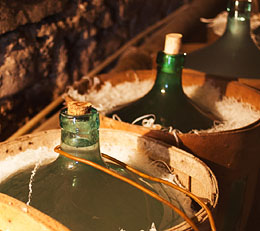 Our wine is still blowing the corks off the carboys. The SG has stopped going down-the wine tastes GREAT-the clarity is great-but, I am a little iffy on going ahead and bottling the wine. Do I need to keep racking our wine to get all the sediment out? What else can we do, to make our wine safe to bottle? These are all really GREAT tasting wines! Some of the wine jugs still have the air-locks in place. Sharyl Name: Sharyl R.
Our wine is still blowing the corks off the carboys. The SG has stopped going down-the wine tastes GREAT-the clarity is great-but, I am a little iffy on going ahead and bottling the wine. Do I need to keep racking our wine to get all the sediment out? What else can we do, to make our wine safe to bottle? These are all really GREAT tasting wines! Some of the wine jugs still have the air-locks in place. Sharyl Name: Sharyl R.State: KANSAS
—–
Hello Sharyl,
You want to do everything you can to get the hydrometer’s specific gravity reading down to .998 or less. If your wine is currently at a higher hydrometer reading than this, you may want to take a look at The Top 10 Reasons For Fermentation Failure. By going over these reasons you my discover something you can do differently to get the fermentation to complete all the way to an S.G. of .998. If you are already at a reading of .998 or less, then your wine is safe to bottle.
One reason corks can pop off a carboy after the fermentation has completed is because of temperature change. If the wine in the carboy warms up a few degrees it can cause the wine to expand just enough to push an air-tight cork out of the carboy’s opening.
As always, you should rack the wine off the sediment before bottling. You should also add sulfites to the wine just right before bottling. This could either be in the form of: Campden tablets, potassium metabisulfite or sodium metabisulfite.
Also, if the fermentation did not get below a specific gravity reading of .998 and you still insist on bottling it anyway, I would strongly recommend adding potassium sorbate (wine stabilizer). This will help to eliminate the chance of a refermentation while in the wine bottles. Potassium sorbate will not destroy the wine yeast, but it will keep it from multiplying and regenerating the size of its colony.
Hope this information helps you out.
Happy Winemaking,
Ed Kraus
———————————————————————————————————
Ed Kraus is a 3rd generation home brewer/winemaker and has been an owner of E. C. Kraus since 1999. He has been helping individuals make better wine and beer for over 25 years.
———————————————————————————————————
Ed Kraus is a 3rd generation home brewer/winemaker and has been an owner of E. C. Kraus since 1999. He has been helping individuals make better wine and beer for over 25 years.

I added one campden tab. and 1/2 tsp full of sulfites to my wine(4.5 liters) produced after 9 months and after 4 times racking just before bottling.A few days later I realized there was a light sediment settled at the side of the bottle and the cork blown off. Hydrometer reading before bottling was 1020 SG. What can I do?
do campden tablets lose thier strength ?
Mine do not desolve in the wine. Can they go off
william/Ghana, this kind of puts you in a tough situation. If the fermentation hadn’t of picked back up, it would have been possible to add potassium sorbate to keep it from starting. But once it gets going potassium sorbate is not very effective. So you have two choices. You can put the wine back into bulk and let the fermentation finish. Or, you can put the wine back into bulk and cool it down to refrigerator temperature. This will stop the yeast active in about 3 to 4 days. At about a week the yeast will have all settled out. You can then rack the wine off the yeast then add potassium sorbate and re-bottle. Oh, there is a third option, store your bottles of wine in the refrigerator until it is consumed. How every you slice it, you will need to take some action. Not doing so will only lead to more corks popping or, worse yet, bottle exploding.
Herman, Campden tablets do lose their strength, but not as quickly as potassium metabisulfite or sodium metabisulfite in granulated form. Your Campden tablet should be good for up to 3 years, unless they were stored in a warm area or exposed to humidity.
Reference William/Ghana letter: The wine was in process 9 months, the SG was still 1.020, the quantity was less than 5 quarts and he added the equivalent of 9 campden tablets. Did he sweeten without potassium sorbate ? What could go wrong ? You could have offered him a little instruction, maybe for his future vintages ???
Michael M., what went wrong was the fermentation was never finished and he tried to bottle the wine anyway. The amount of time makes no difference. The fact that the fermentation stopped makes no difference. The fermentation can start back up at anytime if the conditions are right. Wine yeast can stay dormant in a wine for a couple of years. To avoid this problem in the future one needs to figure out why the fermentation did not complete and try to remedy that reason. The following article can be used for this purpose:
Top 10 Reasons For Fermentation Failure
http://www.eckraus.com/wine-making-failure/